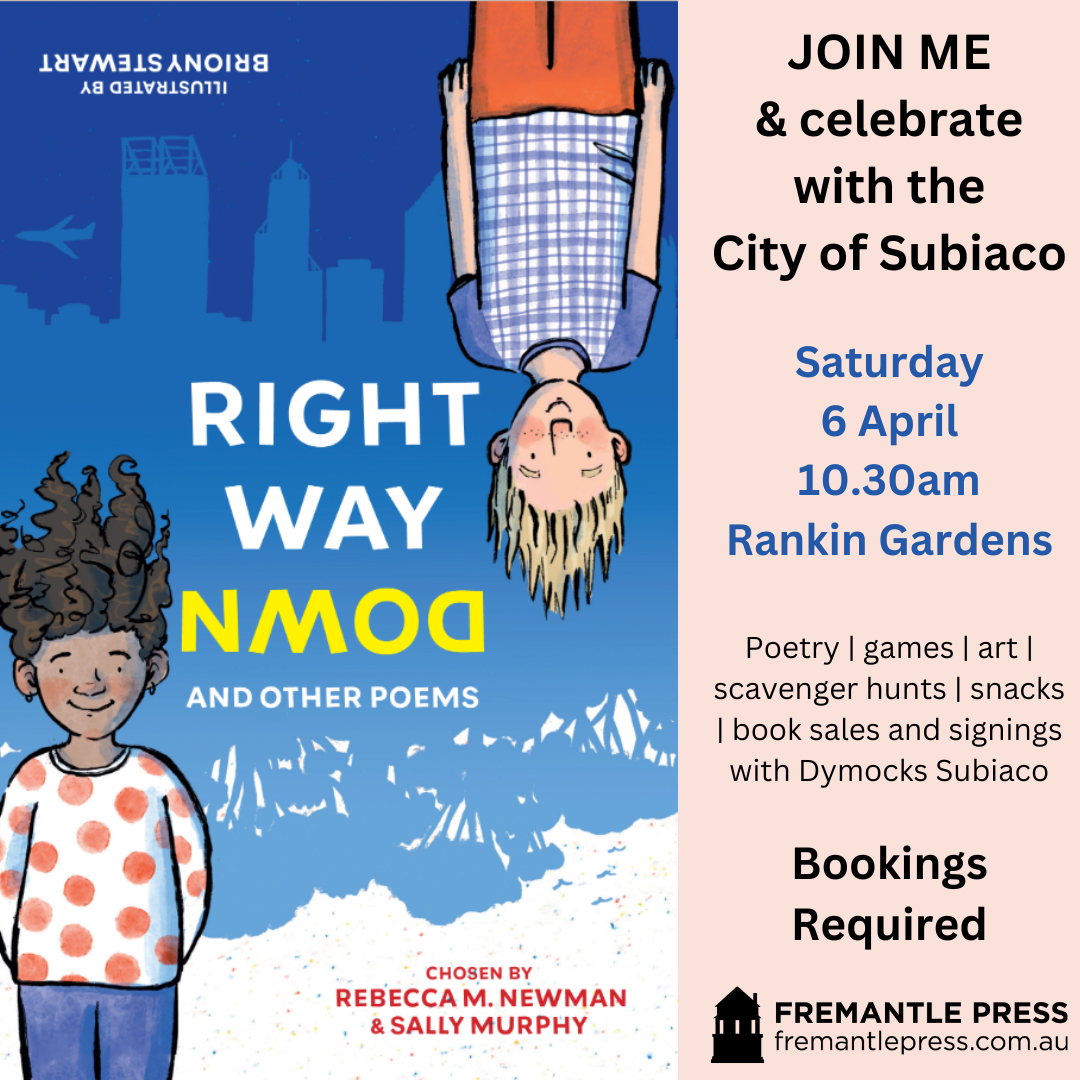
Today we’re pleased to have Lorraine Marwood visiting Alphabet Soup. Lorraine is an award-winning poet, novelist and verse novelist. She likes to write about the goldfields, country life, a tiny moment in time, families, animals, mystery, a longing for something, fantasy … and more! Lorraine’s latest
book is Footprints on the Moon.
From the publisher:
It’s 1969 and life is changing fast. Sharnie Burley is starting high school and finding it tough to make new friends. As the world waits to see if humans will land on the moon, the Vietnam War rages overseas. While her little cousin, Lewis, makes pretend moon boots, young men are being called up to fight, sometimes without having any choice in the matter. Sometimes without ever coming home.
Dad thinks serving your country in a war is honourable, but when Sharnie’s older sister, Cas, meets a returned soldier and starts getting involved in anti-war protests, a rift in their family begins to show. Sharnie would usually turn to her grandma for support, but lately Gran’s been forgetting things.
Can she find her own way in this brave new world?
We’re pleased to have Lorraine visiting today to talk all about the book!

Footprints on the Moon is historical fiction, set at the time of the moon landing and the Vietnam War. How did you go about your research?
I read newspapers, articles, personal stories, and delved into my own childhood memories of that time. This was in contrast with the exciting, exuberant conquering of man on the moon – how could there be such polarizing events operating at once?
I visited the Australian War Memorial and one impression that stayed was the fierce unearthly sound of the helicopters (choppers) that were an integral part of the Vietnam War. I came away with much material to read and ponder. I had newspaper articles of Vietnam War experiences, I researched posters of protest movements, found out numbers of conscripts sent to Vietnam etc.
Similarly I researched the moon mission and had many articles and booklets to read from many years collecting. I knew I wanted to write about this era but when it came to writing the book I needed to delve more deeply and think about the questions the teachers in the book might ask students about the Vietnam War. I also knew the prevalent attitudes of political and establishment at that time, as well as communism, had to be shown too. I also spoke with Vietnam veterans and families affected by the conflict.
This is your fourth verse novel. Can you tell us a bit about the editing process for a verse novel?
A very interesting question as I feel this verse novel is different in format from my other verse novels – each format seemed to reflect the subject matter and as this was set in a high school, it was written for a slightly older audience than two of my other verse novels.
Each poem or section has its own title to lead us into the narrative. I think the editing is the same for other novels, to get facts right, to get the main character to shine in her own story, to see growth in the character from start to finish, to find a climax of narrative, a progression, a flow, to take out unnecessary words and especially for the verse novel, to make sure those spontaneous lines of poetry flow and sparkle.
Did you watch the moon landing in 1969? Were you aware of the Vietnam War?
Yes indeed – just as the book says – in the cookery room of my secondary school, amazing, amazing and then looking up at the moon at night and noting that it had been conquered and was not the same mysterious orb that had always been there.
Yes the Vietnam War impacted family around me, male acquaintances anxiously waited for their birthdate to come up in the ballot. Political opinion was being rocked, the establishment was called into question and protests, especially the Melbourne ones called young protestors into action, to change history as it were.
Do you have a tip for young writers who’d like to write historical fiction?
Yes, delve into that era, immerse yourself in the nitty gritty of daily life, food, clothes, world events because this is where your story will flourish. Ask questions of anyone who might have experienced that era (contemporary era) look at old newspapers online, examine as many resources as you can, to see an entry point that resonates with you, then write the story. Once that is down you can check the facts later.
Can you tell us a bit about your next writing project?
Another historical novel – but not a verse novel, a longer one with mystery in it. I have researched the era it focuses on for years and years and written it on and off for years also and now have stripped it back and begun again. I am also tackling plot which is hard for me as I am a pantser but this will be a bigger novel …
Then of course I have enough material for another poetry collection and I’ve always wanted a picture book … lots of material there to work on!
Footprints on the Moon is out now! Look for it at your favourite bookshop or local library.
AWESOME EXTRAS:

Download teachers’ notes from the publisher’s website
Do you live in Victoria? Go to the book launch celebration at the Bendigo library! 11 am, Saturday 27 February 2021. It’s free but you do need to book tickets online.
Read our earlier interviews with Lorraine Marwood –

















 MEET THE AUTHOR
MEET THE AUTHOR



